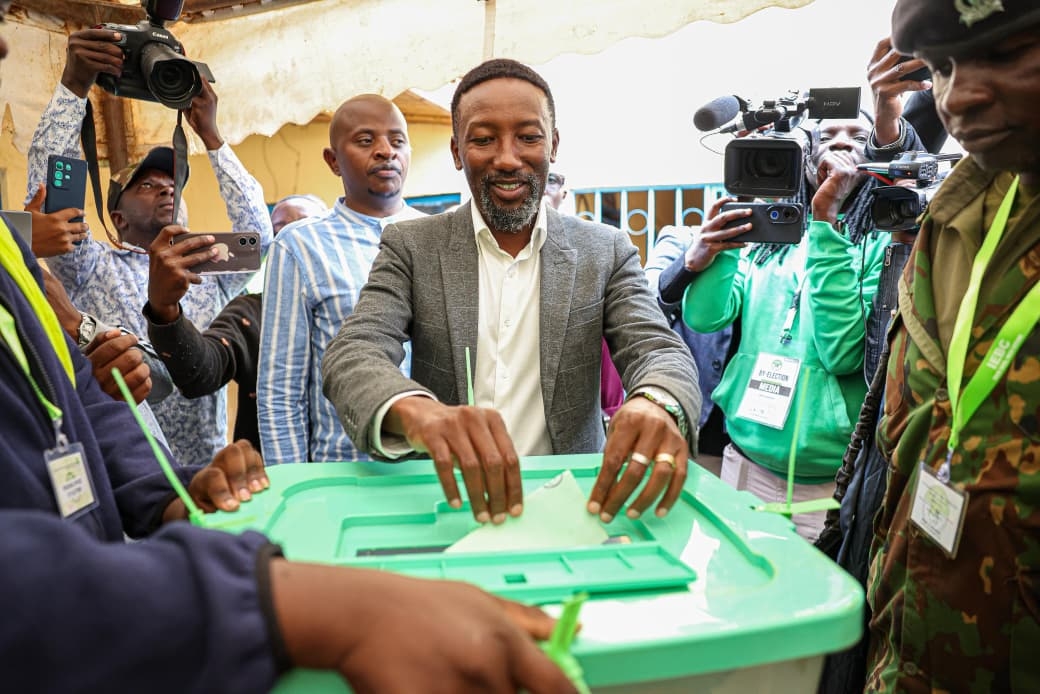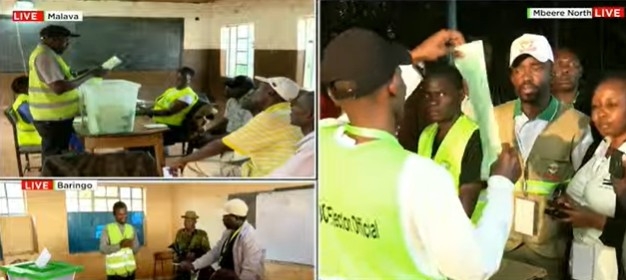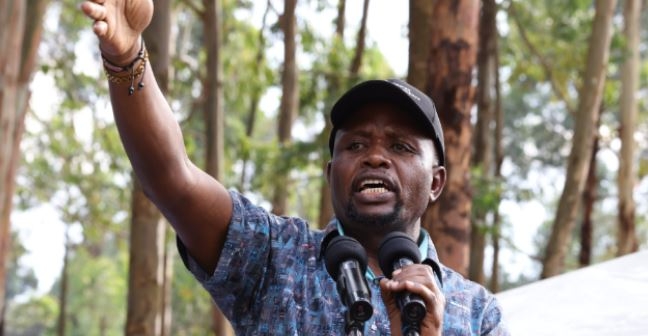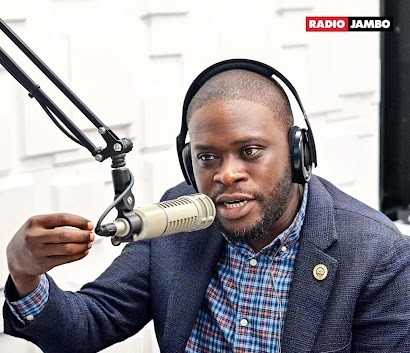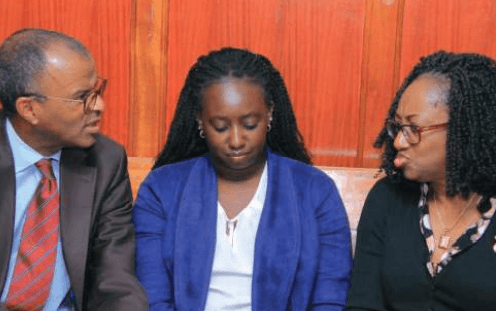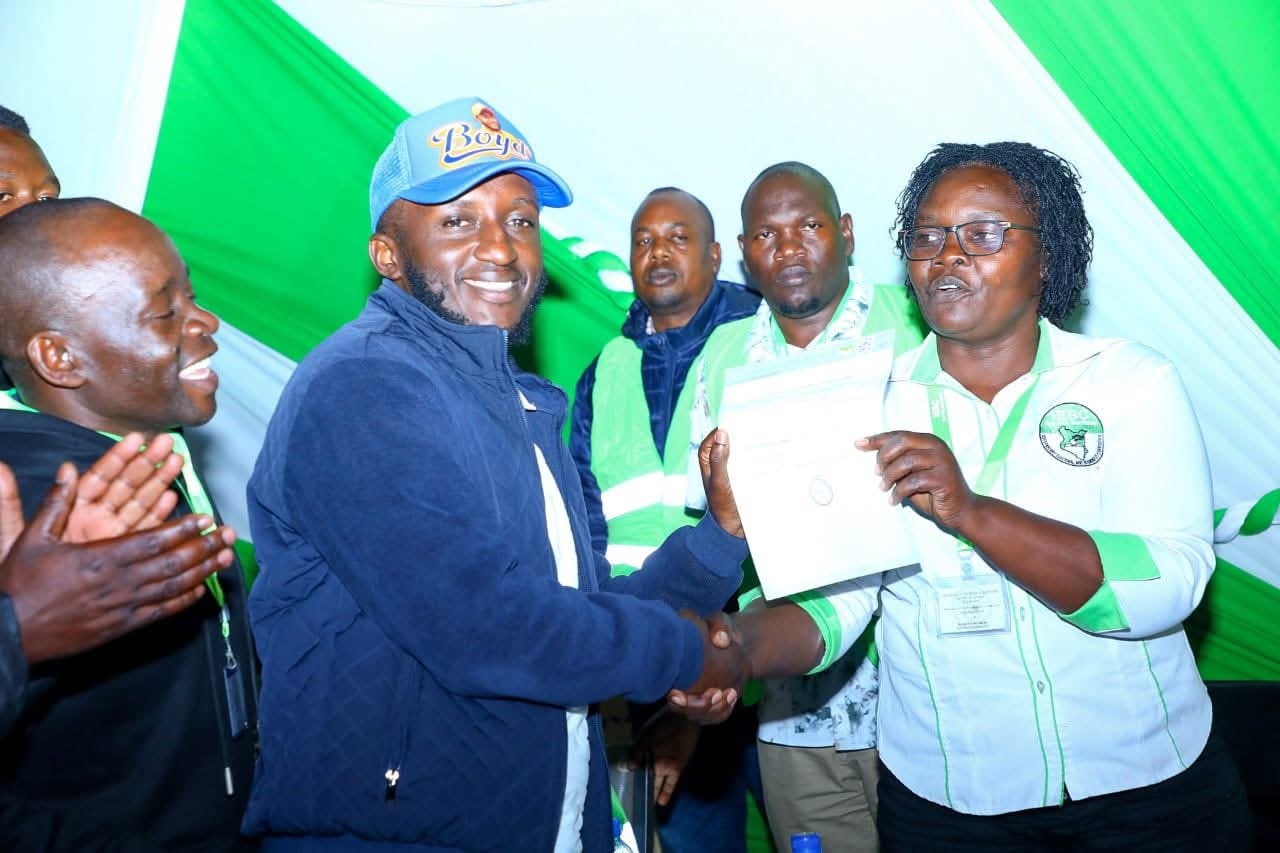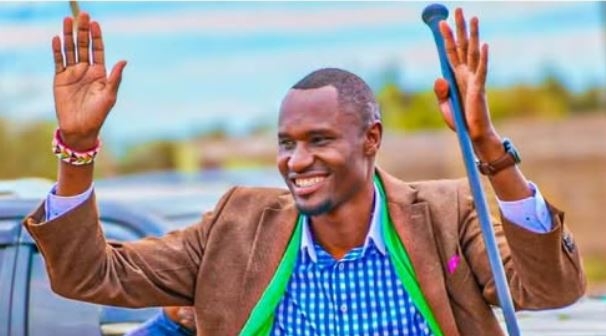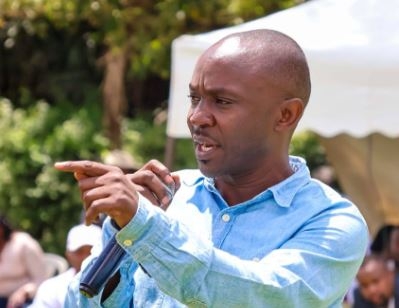This is Edna Leparaku’s memory of Covid-19.
She had just finished repairing her goat shed one afternoon in July 2020 when she saw her husband’s motorbike slowly approaching from afar. It kicked up a continuous cloud of red dust that hung lazily in the air before dispersing away.
Leparaku Ole Shilalo returned home early, crestfallen.
He usually sold goat milk to a vendor near Ildamat market in Kajiado county. The vendor would buy from many herders and sell the milk in Kajiado town, and sometimes in Nairobi.
Leparaku's family would spend the money on food and to cover other household expenses.
“That day, he did not sell any milk. This went on for many months,” Edna says. The Covid-19 lockdown was beginning to bite.
Of course, the milk was not wasted. They could take it as kule naaoto (sour milk), or as eng'orno (curdled).
But that meant the family had nothing else to feed on.
A 2022 Kenya National Bureau of Statistics (KNBS) household survey found that 51.2 per cent of women countrywide were rendered jobless by the pandemic.
That included Edna, who tended the family goats and used the income from milk to feed her family of two young children.
In 2021, Edna, then 26 years old, was selected for a social protection pilot programme to support vulnerable households and increase their resilience.
The programme – known as Universal Child Benefit – was piloted in Kajiado, Embu and Kisumu counties.
Each mother received Sh800 monthly upkeep for every child below three years. The money was paid once every two months between November 2021 and December 2022.
The women also received regular nutritional and child development advice from county nutritionists and community health promoters.
One year later, multiple assessments show increased financial stability for the families and significant improvement in their children's health.
Policymakers are now studying these outcomes to understand how such low-cost interventions can be replicated elsewhere.
Although the programme ended, several groups of mothers have continued with their income-generating projects
The State Department for Social Protection said this intervention was necessary particularly due to the Covid-19 impact. In early 2021, nearly a third (31 per cent) of households with children reported not having enough food to eat, and 67 per cent of children under five years did not consume iron-rich foods, including meat, fish and poultry. A quarter of children under five years of age were stunted, the department said.
The UCB pilot programme was financed by Save the Children, Unicef and World Food Programme and was coordinated by the Department of Social Protection in the Ministry of Labour in collaboration with other relevant government departments at the national and county levels.
IMPACT TESTIMONY
Edna’s firstborn is now eight years old, and her lastborn is nearly two years old.
“I got my lastborn in a hospital [in Kajiado] and I was enrolled in the programme. We were taught about exclusive breastfeeding for six months and a balanced diet after that,” she says.
“The doctor (nutritionist) also said if I eat well, there will be enough milk for my child for at least six months,” Edna says. “So nowadays, I eat two meals in a day. Before I would eat once.”
She would receive Sh1,600 after every two months.
At first, Edna spent the money directly to buy foods, such as vegetables and eggs. She bought her own chicken after a few months. “So now I do not buy eggs or chicken meat. I sell them.”
In some villages in Kajiado, women in the pilot joined hands and formed self-help groups.
“We are a group of 15 women. We meet every Saturday. We contribute Sh100 every month,” says Joyce Kakenya, 35, the secretary of one group in Oderekesi village in Kajiado Central.
She has four children. The eldest is 15 years and the youngest was three months old when she joined.
“I used the money to buy fruit because the community health workers insisted a child must be breastfed exclusively for six months and after that must get balanced diet.”
Joyce and her group members continue to meet nine months after the pilot ended.
“We made kitchen gardens, where we plant vegetables and keep chicken for eggs,” Joyce says.
“So far, we have 14 chickens. We also save some of the money so members can borrow and buy other foods for their children.”
She recently borrowed Sh4,000 and will return it with interest.
Joyce sees a clear difference between her older children and those born during the pilot.
“I have breastfed my last born exclusively for six months. I have not taken her to the hospital as often as I did my firstborn, who is 15 years old.”
BREASTFEEDING SIGNIFICANCE
The World Health Organisation (WHO) first made its global recommendation that infants should be exclusively breastfed for the first six months in 2001.
This advice was based on a systematic review of existing breastfeeding studies. The review concluded that exclusively breastfed babies have fewer infections and that the babies experience no growth problems. But the uptake globally has been slow.
Josephine Keloi, the Kajiado Central subcounty nutritionist, says colostrum, the first milk after the mother gives birth, is nutrient-dense and high in antibodies and antioxidants to build a newborn's immune system.
“It also clears meconium (a newborn's first poop). Breastfeeding also reduces risks for breast and ovarian cancer,” she says.
She says about 2,400 families benefitted from the UCB programme in Kajiado.
The uptake of exclusive breastfeeding has become one of the biggest wins of the universal child benefit scheme in Kajiado.
“Customs discourage people from exclusive breastfeeding because people think young children need solid food to grow," Keloi says.
"We are also working with traditional birth attendants to educate women."
The results are clear.
“The exclusive breastfeeding rates in Kajiado are now 82 per cent, compared to 34 per cent in 2018,” Keloi says.
This has partly contributed to the slight reduction in stunting rates from 25.3 per cent in 2018 to 21.7 per cent in 2023, based on facility surveys.
The exclusive breastfeeding rates in Kajiado are now 82 per cent, compared to 34 per cent in 2018
Keloi says the cash transfers are also important because nutritional advice may be useless if mothers have no money to buy balanced food for themselves and for older children.
Ruth Mbuthia, the programme officer of Universal Child Benefit at Save The Children, said although the programme ended, most groups of mothers continued with their income-generating projects.
“For instance, the kitchen garden and chicken-rearing projects run by the women are still ongoing.”
The women with those projects are more financially independent and do not have to beg money from their husbands.
Assistant director for children's services Peter Ombasa said such cash transfer programmes contribute to inclusive economic growth by reducing the existing social inequalities.
He said if children are well taken care of, this boosts the country’s human capital development.
Ombasa said in rural areas, poverty leading to poor nutrition adversely affects the optimal growth of children, which limits their future productivity.
“Most of our communities and by and large children are living in low-income areas and are easily affected by financial setbacks and consequences,” he said.
MEN IN PARENTING
James Kobaai stands six feet tall. He speaks emphatically in a self-assured demeanour. He is the senior chief of Ildamat location in Kajiado.
On this day, Friday, he joins a group of women in their small garden, where they have grown pumpkins and vegetables.
He works closely with women to encourage other Maasai men to embrace the direct raising of their children.
“It was hard initially because, traditionally, it is a woman’s job to raise children. But many men now embrace it,” Kobaai says.
“Sometimes the woman is away and the man has to step in to feed children.”
He says no cases of child neglect have been reported to him but, still, men and women are taught now to take care of their children nutritionally.
“The cash transfers really helped because women can buy food and clothes for the children.”
The Maasai accept polygamy as a way of life. But 38-year-old boda boda rider Leparaku Ole Shulalo jokingly makes it clear he has only one wife, Edna Leparaku.
He is not only a boda boda rider but now stands tall among goat and chicken farmers courtesy of his wife, Edna.
“The [UCB] project was very good because my wife would use the money to buy foods we don’t have, such as vegetables and fruits. She also bought two chickens that have multiplied," he says.
Leparaku used to leave his house before daybreak to fend for the family.
“I would rise early to hawk milk and hustle so that my family does not lack food. Sometimes it was frustrating, I would return mapema (early),” Leparaku says.
Nowadays he completes his increased household chores before leaving midmorning or, like today, in the afternoon.
He owns an old motorbike that he plans to replace soon. Its automatic start button broke a few years ago. To start the engine, Leparaku pulls the starter lever out from the right side of the motorbike with his hand.
He places his left foot on the ground and plants the right foot on the lever, pushing it down firmly three times to jumpstart the bike.
The throaty growl of this old engine excites him. Edna is embarrassed but smiles. He smiles back and rolls away, leaving behind a cloud of red dust.



